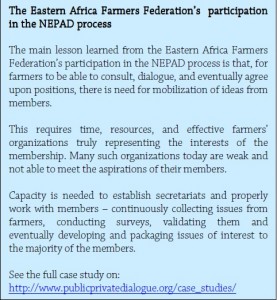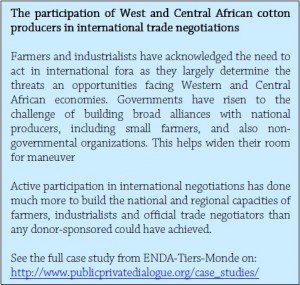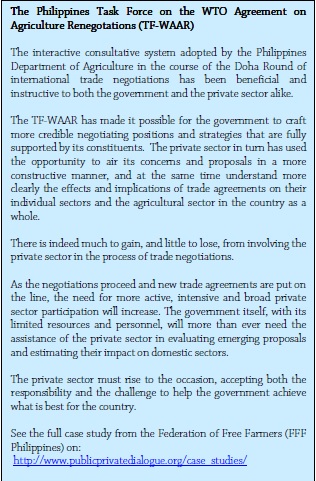The issue: Just as sub-national opportunities for dialogue should not be ignored, neither should the potential for PPD to contribute in the international arena – especially in preparation for negotiations on treaties and trade talks. It makes sense for governments and private sectors to cooperate on opportunities such as trade, tourism and exploitation of natural resources in international fora.
PRINCIPLE X: INTERNATIONAL ROLE
Broad and inclusive public-private dialogue can effectively represent and promote national and regional interests of both public and private actors in international negotiations and international dialogue processes.
- Complex international challenges require broad, ad hoc alliances between state and non-state actors. These should be transparent, inclusive and open access.
- Involving local partnerships at international levels can give a more effective voice to national and regional interests by helping public and private sectors coordinate and thus widen their room for maneuver.
- International partners can foster an informal process of regional and multilateral policy dialogue, setting an example for national-level initiatives.
As economies become increasingly interdependent, development challenges confronting public and private actors call for international approaches – at regional or global levels. Examples include infrastructure, tourism, environment, stability, trade and research, some of which are already tackled primarily in the framework of global or regional intergovernmental organizations, such as the World Trade Organization (WTO).
To influence outcomes at international level, national private sector organizations must coordinate at the international level, form transnational networks and engage with governments at the regional or global level. Affiliation to transnational business networks allows private sector groups to take their concerns and proposals into the international arena.
Just as national PPD is a prerequisite to effective joint public-private engagement in international dialogues, so international dialogues can boost national PPD: when international challenges become daunting for the economy, public and private actors may find ways to overcome any reluctance to work together.
C.10.1. Government-private sector partnerships at national level can prepare for international negotiations and dialogue
PPD can be used to define positions that are to be defended by national government delegates or negotiators abroad. PPD can also identify the strategic challenges that will be determined by negotiations and dialogue processes outside the country, and prepare the ground by putting them on the national or regional agenda. The WTO negotiations, which recommend governments to consult with their private sector during the accession process, provide a good ground for establishing such relationships. It is important for PPD to establish clearly why both the public and private sectors should consider challenges to be priorities. This may involve educating partners in dialogue, for example by public awareness campaigns to enhance government sensitivity or to dramatize the issue and to demystify PPD process for private sector actors.
C.10.1.1. A clear private sector mandate boosts a government’s legitimacy and enables
Governments that have secured the support of their domestic private sector for their negotiating stances are able to claim enhanced legitimacy for their positions in the international arena.
The technicalities of international negotiations can overwhelm government capacity, expertise and experience. Public sector negotiators can therefore benefit from tapping into the expertise of the private sector. Data, analysis and advice provided by the domestic private sector can be critical for governments involved in international negotiations or dialogue.
C.10.1.2. International programs of PPD should be sensitive to a country’s broader economic interests
Entrepreneurs should make sure that government commitments made in an international context are informed by the country’s economic interests and needs. Private sector actors must be encouraged to approach PPD that informs international negotiations in terms of what is best for the country as a whole. This means evaluating trends and assessing their impact on domestic sectors – for instance, a country’s liberalization commitments should be informed by the capacity of the national industry to engage in freer trade with foreign competitors.
C.10.2. International PPD should be inclusive and actively seek out key participants
From the public sector side, PPD should include officials who are involved in international negotiations and dialogue, both within the negotiating team itself and in the capital-based administration.
When inviting representatives from the private sector, it is important to ensure that they are dependable sources of input:
- All key sectors of the economy are adequately represented – including
farmers, who are often excluded from the “private sector” but do not fit neatly into the “civil society” category either. - Participants are genuinely representative of local business communities, and able to generate feedback and information from their local constituencies.
- Participants have analytical skills, can understand impact assessments, and are able to analyze complex issues.
C.10.2.1. Build alliances with NGOs, development partners and transnational BMOs
Internationally-oriented PPDs can be enhanced by efforts to build broader alliances encompassing local and international NGOs, development partners, transnational business associations and public opinion.
In particular, NGOs, development partners and transnational business associations often prove a reliable source of expertise and analysis underpinning national governments’ and business communities’ positions in the international arena.
NGOs and development partners may:
- play an essential advocacy role in raising awareness among public opinion, governments and international organizations;
- serve as an interface between authorities and the local private sector, especially parts of the private sector that may be poorly organized, lack analytical capacity, or have little influence on government – for example, small agricultural producers;
- be instrumental in formalizing the dialogue between governments and the private sector on issues to be tackled at the international level, such as by educating local private sector and officials in the working of international fora.
C.10.3. PPD at the international level needs an appropriate institutional framework, and to be time bound
International negotiations and dialogue processes are often complex, protracted and require specialized skills. Without a specific institutional framework, any PPD will struggle to cope with this complexity.
C.10.3.1. Channels of communication must balance expertise and legitimacy
A consultative mechanism for the private sector must do two jobs: it must be a channel for substantive and advanced analysis performed by the most expert sections of the local
business community, and also a source of legitimacy for official positions in the international arena.
This may typically involve a core group of experts from the private sector providing analysis and advice, and a larger business consultative body discussing and endorsing official positions.
C.10.3.2. Give specific assignments to a core group of private sector experts
A core group of private sector experts with relevant fields of expertise should be given specific assignments and tasked to interact regularly with officials, both in negotiating teams
and in capital cities. Their task is to help departments develop detailed negotiating
positions and strategies, model the effects of proposed agreements on domestic sectors, and generate feedback and information from their contacts both locally and abroad.
C.10.3.3. Integrate consultative mechanisms with the government’s internal structure
Consultative mechanisms should be synchronized and integrated with the government’s internal structure for handling the negotiations.
Consultative mechanisms must guarantee active, regular, and sustained involvement and constant interaction with negotiators and public officials throughout the negotiation process, which is usually protracted and difficult. This implies providing for more-or-less permanent membership on consultative bodies.
C.10.3.4. The consultative process should be participatory and inclusive on the private sector side
In particular, representatives of private sector organizations must carry out similarly participatory and interactive processes within their own organizations. This is essential to guarantee that PPD consists of a genuine bottom-up approach, with the negotiating team getting to hear concerns from the grass roots.



